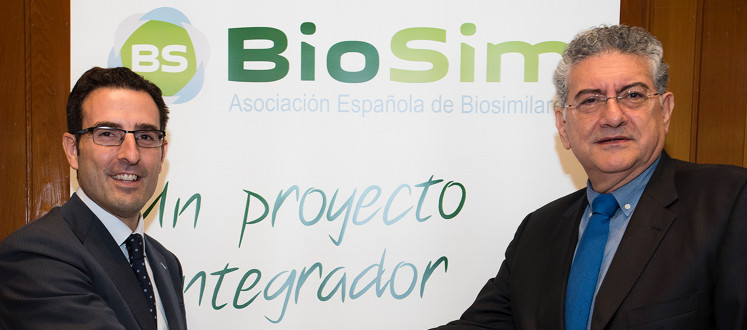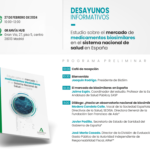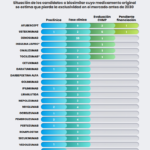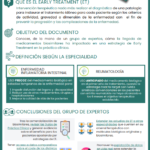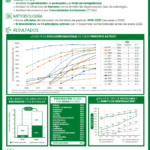Presentation of the new Spanish Association of Biosimilars at the headquarters of the Ministry of Health, Social Services and Equality in Madrid
- Biosimilar companies are integrated into BioSim with the aim of establishing a fluid and constant dialogue with health authorities, contributing to access to biological therapies for a greater number of patients, making biosimilar medicines known to health professionals and the general population. and defend the position of the biosimilar drug.
- biosimilars, medicines equivalent in terms of quality, efficacy and safety to biotechnological medicines of reference, which have finished their patent will contribute to an estimated saving of over 1.500 million euros for administrations by 2020.
- It is expected that in 2018 these products, which will improve citizens' access to treatment for serious illnesses, will represent 50% of spending on medicines.
Madrid, 3 November 2015.-The Spanish Association of Biosimilar Medicines (BioSim), which was presented this Tuesday at the Ministry of Health, Social Services and Equality in Madrid, was created with the aim of strengthening the position of the biosimilars industry in Spain. biosim brings together the companies Accord, Boehringer Ingelheim, Cinfa, Gedeon Richter, Kern Pharma, Lilly, mAbxience, Merck, Mylan, Novartis, Rovi, Sandoz, Sanofi, Stada and Teva, to integrate and join forces for the benefit of biosimilars, some medicines equivalent in terms of quality, efficacy and safety to reference biotechnological medicines, which will mean savings of around 1.500 million euros for administrations by 2020 and will improve citizens' access to treatment for serious diseases.
biosim is a non-profit organization that opens its doors both to laboratories that are already operating in the biosimilar market and to original product companies that have launched, or are going to launch, a biosimilar division; be it for development, production or commercialization.
The BioSim presentation ceremony was chaired by the General Director of Basic Services Portfolio of the National Health and Pharmacy System, Agustín Rivero Cuadrado, accompanied by the Deputy Director General of Quality of Medicines and Health Products, Carlos Lens Cabrera, and was attended by the participation of the President and the General Director of BioSim, Joaquín Rodrigo Poch and Ángel Luis Rodríguez de la Cuerda, respectively.
In the debate that has served as the presentation of BioSim, representatives of the administration, academia, medicine, hospital pharmacy and patients have met.
biosim has launched a plan to make the different interest groups aware of the advantages and services provided by the Association. Through various channels of communication -such as the social networks Twitter, Facebook and Linkedin- all the projects and initiatives that are going to be promoted from biosim, which in turn will be published in www.biosim.es
The BioSim Board of Directors is made up of:
President:
Joaquín Rodrigo, Sandoz Pharmaceutical
Vice president:
José Eduardo González, ROVI Pharmaceutical Laboratories
Secretary:
Manuel Martin, Mylan Pharmaceuticals
Treasurer:
Pepa Martinez, Kern Pharma
Vowels:
Naouel Zouaghi, mAbxience Holding
Ana Polanco, Merck
Paloma Isabel Palomo, Sanofi-Aventis
Biosimilar medicines in figures
The biosimilar medicines market in Spain bills around 40 million euros, a figure that could multiply exponentially over the next five years. Forecasts suggest that in 2018, biopharmaceutical products will represent 50% of spending on medicines. Between 2015 and 2019, the patents of 12 of the world's best-selling biologic medicines will expire. These are biopharmaceuticals that affect key therapies such as cancer, diabetes, multiple sclerosis or rheumatoid arthritis and that, in addition, are among the most important in terms of costs for health systems (an investment of around 150 million euros per product).
For equity and contribution to the sustainability of the SNS
This situation will favor the irruption of a new generation of biosimilars and the opening of a potential hospital market of 1.500 million euros that will generate -according to data from recent studies- savings of around 20%. On the other hand, in addition to contributing to the financial sustainability of our National Health System, the irruption of these new biosimilars will play a fundamental role for the health of citizens by improving the conditions of access to biological treatments for serious diseases.
Furthermore, by freeing up financial resources from the System, biosimilars will help promote the integration of innovation in the pharmaceutical market and will contribute to the optimization of therapeutic protocols.
